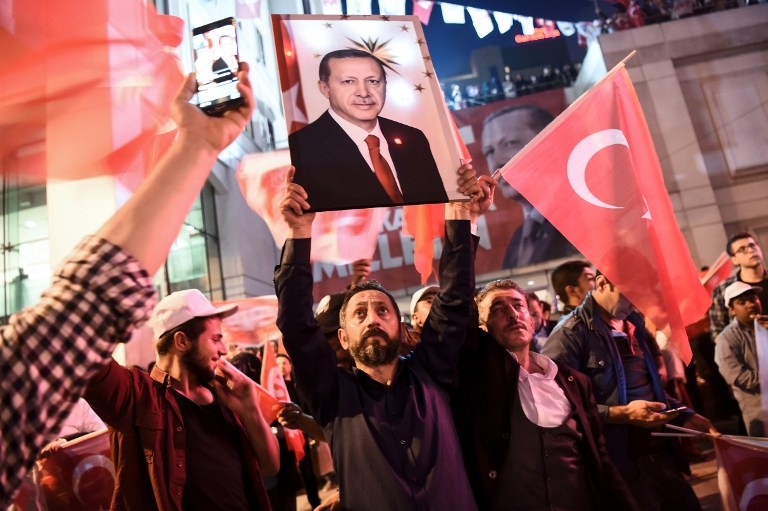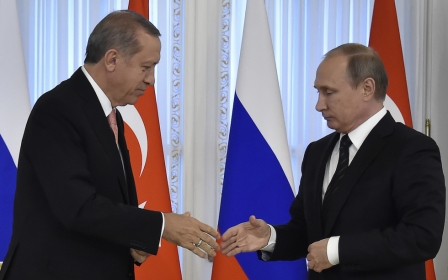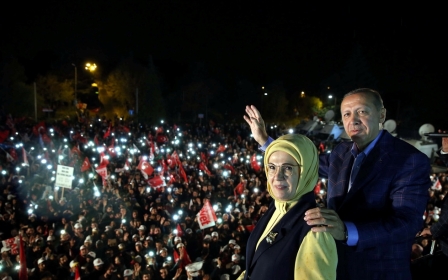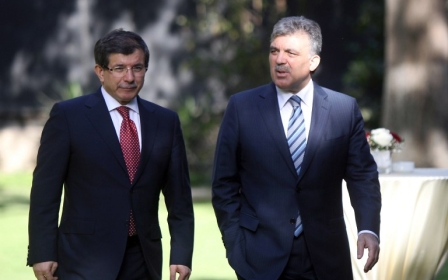Conciliation is not on the cards after Turkey’s referendum

Following Turkey’s national referendum on Sunday, the country’s president, Recep Tayyip Erdogan, adds yet another notch to his belt of election victories. On this occasion, he managed to convince the majority of Turks, albeit by the narrowest of margins, to vote in favour of constitutional changes that would grant him greater powers and effectively transform the country’s parliamentary system into a presidential one.
That so many Turks were content to effectively end their country’s fledgling democracy in favour of de facto one-man-rule, speaks bounds not only about his popularity, but also who he represents
Erdogan’s "Yes" campaign was both aggressive and abrasive. They had no hesitation to liken naysayers to coup plotters and terrorists. Erdogan threatened and insulted European nations. Together with the Justice and Development Party (AKP) government, Erdogan organised dozens of mass rallies across the country while the streets of Turkey’s cities were awash with "Yes" posters, banners and placards.
Turkey’s long embattled media relayed hours of government propaganda while dedicating very little time to the "No" campaign. There was even a feature-length biopic about Erdogan's life. He was depicted as a young coming-of-age politician, a hero battling against the forces of darkness.
Erdogan will now have considerable powers including the right to hire and fire government ministers without parliamentary consultation, the right to lead a political party, dismiss parliament, declare a state of emergency, veto parliamentary legislation and issue his own decrees.
Erdogan, after the changes go into effect in two years, will also be able to appoint almost half of the members of the Higher Council of Judges and Prosecution, which will become the country’s high court and the body that appoints judges.
With such powers granted to one man, it will be difficult for international powers, especially Europe, to call Turkey a democracy. That so many Turks were content to effectively end their country’s fledgling democracy in favour of de facto one-man-rule, speaks volumes not only about Erdogan’s popularity, but also who he represents.
The underdog narrative
Erdogan symbolises a large and important constituency. The name of the party that Erdogan co-founded in 2001 was the Justice and Development Party. The word "justice” features in the party’s title not simply for decoration. Erdogan and his political associates were determined to right the past wrongs that had befallen their country’s religious conservatives, as well as those from Turkey’s Anatolian heartland and the urban poor.
They were the downtrodden and the main losers of the secular state-building project of Turkey’s first president and founder Mustafa Kemal Ataturk during the 1920s and 1930s, and his Kemalist followers who, along with the military, would dominate the bureaucracy and state institutions long after Ataturk’s death.
Erdogan’s dictatorial nature appeals to the anger of those who for years felt marginalised in Turkish society. They saw themselves as the primary victims of secularism and the military’s legacy of interference in government, especially the 1997 military intervention that ousted the Islamic prime minister Neccmettin Erbakan of the Welfare Party (a party that Erdogan once represented) from office.
When in power, Erdogan and his supporters saw plots, Kemalist or otherwise, at every corner - whether it was the 2008 closure case against the AKP for violating secularism (the AKP managed to avoid being closed but had to pay a hefty fine), so-called “deep state” conspiracies to overthrow the government, or the intrigues of the “parallel structure”, otherwise known as the Fetullah Gulen Terrorist Organisation (FETO). Followers of the self-exiled Turkish Islamic cleric residing in Pennsylvania, who were once the fellow travellers of the AKP, are now accused by Erdogan and the government of infiltrating state institutions and spearheading last July’s botched coup.
A time for healing?
However, at least half of Turks do not identify with Erdogan’s underdog narrative and view his behaviour with serious apprehension, especially his quest to dominate all aspects of society from family values to the nature of the urban landscape. They loathe his autocratic tendencies, his us-vs-them style of politics and firebrand rhetoric.
Turkey is a young society and many do not recall Kemalist domination or the military’s involvement in politics. Instead, they see Erdogan as a dictatorial politician who uses brutal measures to silence opponents. They consider themselves Erdogan’s victims.
Turkey has never been weaker and divided. The country has been convulsed by a terror threat which has claimed hundreds of lives. Turkey has been under - and is still under - a state of emergency since last July’s attempted coup, and there has been a subsequent purge against state employees leading to 140,000 suspensions and 40,000 arrests.
Meanwhile, the Kurdish southeast has descended into war, with devastation echoing the dark times of the 1980s and 1990s which killed 40,000 people. There are also politically charged arrests, an embattled civil society, an ailing economy and wide-ranging discontent from many different quarters of society.
Turkey needs to heal its divisions or else risk being in a permanent state of crisis. Optimists hope that the result of the referendum in the beginning of this process; however, judging by Erdogan’s rhetoric and past behaviour, this is just wishful thinking.
- Dr Simon A Waldman is Visiting Research Fellow at King's College London. He is the co-author of the recently published, “The New Turkey and Its Discontents” (Hurst: 2016). Follow him on Twitter @simonwaldman1
The views expressed in this article belong to the author and do not necessarily reflect the editorial policy of Middle East Eye.
Photo: A supporter of the "yes" brandishes a picture of Turkish president Recep Tayyip Erdogan among other supporters waving Turkish national flags during a rally near the headquarters of the conservative Justice and Development Party (AKP) on 16 April 2017 in Istanbul after the initial results of a nationwide referendum that will determine Turkey's future destiny (AFP)
New MEE newsletter: Jerusalem Dispatch
Sign up to get the latest insights and analysis on Israel-Palestine, alongside Turkey Unpacked and other MEE newsletters
Middle East Eye delivers independent and unrivalled coverage and analysis of the Middle East, North Africa and beyond. To learn more about republishing this content and the associated fees, please fill out this form. More about MEE can be found here.





